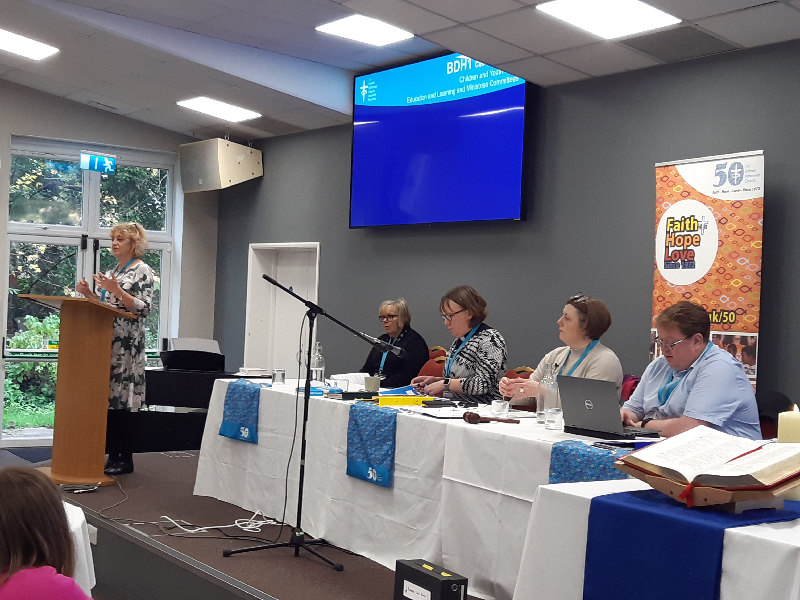Day two of the United Reformed Church Assembly Executive opened with Advent worship led by the Revd Lindsey Sanderson, Chaplain to the General Assembly Moderator.
The Revd Maxwell Reay, Minister with the Metropolitan Community Church and chaplain focusing on queer and mental health needs, offered a pre-recorded personal reflection on Jubilee for the LGBTQI+ community.
Session four
Paper G3: M&M Fund Budget
On behalf of the Finance Committee, the Treasurer, Mr Ian Hardie, asked the Executive to adopt the Mission and Ministry Fund budget for 2023. In summary, he reported that income for 2023 is expected to be slightly up on 2022 and expenditure considerably less. However, Mr Hardie said the URC still faces a deficit for 2023.
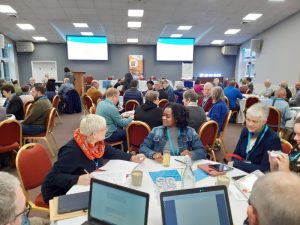
He also added the caveat that the budget had been prepared on the basis that a new pension scheme will begin both for ministers and lay staff, with effect from 1 January 2023. If there is a delay in implementing this, figures might change.
The finance committee had been encouraged that figures for M&M contributions by synods and local churches are estimated to be slightly higher than the 2022 figure. As a result, 2023 budgeted income is more than £100k above the 2022 budget figure. Expenditure is likely to fall back slightly.
There had been some difficult discussions leading to a 9% increase in stipends and staff salaries. Using the more usual formula, an increase of 6.6% would have been expected.
The outcome of all the calculations is a £664k deficit. Mr Hardie concluded by saying there has been a recent trend of deficits, and that we need to find a way of reversing this.
Turning to questions and discussion, the Mr Hardie explained the reasoning behind the 9% stipend increase. Acknowledging that, at the point when the budget was being put together, there was already growing concern over rising costs of living, synod moderators, the General Secretary and others had discussed anecdotal evidence; recognising the diverse circumstances experienced by ministers and their families. The Finance Committee had proposed sticking with 6.6% and adding another lump sum but the URC Trust felt that an increase spread across the year would be more welcome.
One representative argued that lay staff members may be subject to additional cost rises that ministers don’t experience e.g. council tax. Responding, Mr Hardie said the renumeration committee has a little more flexibility in setting salaries and takes comments from staff members.
Asked for his ‘vision for the deficit’ Mr Hardie said that, in the short term, it’s sustainable, but that reserves are finite and there are existing commitments, including to the minister’s pension fund deficit. Mr Hardie hopes the Church Life Review Group will look at the 14 separate trusts and see ‘where the money lies’ compared with ‘where it’s needed’. This has been raised before and the Treasurer believes this needs to be addressed again. Referring to the money held by the 14 trusts as the ‘family wealth’, the General Secretary concurred with the Treasurer – that deficits are sustainable for a short while, but in the longer term we need to address our financial situation differently. However, he cautioned against quick fixes that make for bad longer-term decisions.
After another representative thanks the finance committee for its compassionate approach to setting stipends and salaries, the budget was accepted unanimously.
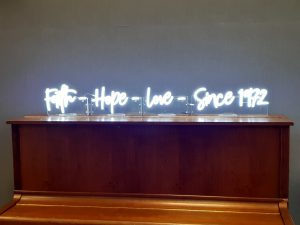
Paper G2: Finance Benevolent Fund and Energy Crisis Fund
Ian Hardie, Treasurer of the United Reformed Church, presented this report on proposals to set up funds to support retired ministers and churches who face difficulties because of the energy crisis.
Mr Hardie reported that the Finance Committee had arranged a meeting to discuss the setting up of these funds on 14 December. Because the meeting had not yet happened, Assembly
Executive were being asked to approve the proposals in principle.
Some questions and comments from members of Assembly Executive followed. The proposal is to give financial support to ‘mission-oriented churches’ – how would we decide which churches these are? Mr Hardie suggested that the funds would be administered by synods, who would make those decisions, but that this would be discussed at the 14 December meeting.
Asked whether the funds would be designated or restricted, Mr Hardie said they were more likely to be restricted.
It was pointed out that significant amounts of money are held by some local churches as well as some synods.
The resolution was carried unanimously.
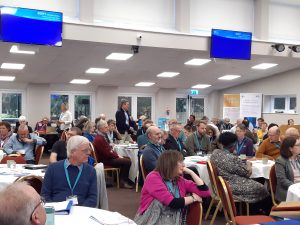
Paper H3: Marks of Ministry of an Elder and Marks of Ministry of an Elders Meeting
This paper had been remaindered from session two and was presented by Mary Thomas, Convenor of Ministries Committee, who advised that Paper H3 goes together with the Guidelines on conduct and behaviour for Elders.
Having established a Roll of Elders, this paper and outlines the marks of ministry that the URC can reasonably expect of people who are called to be an Elder and how Elders can exercise their skills in the Elders meeting.
The paper divides the Marks into two sections: what an Elder should be and how the collective Elders’ meeting should include the Marks.
The paper therefore outlines that an Elder should be:
- A faithful disciple of Jesus Christ
- A person of integrity and prayer
- A person who cares for others, and
- A person of accountability
The Elders’ meeting should:
- Pastorally care for others
- Be a ministry of oversight for the church
- Focus upon mission and evangelism
- Participate in the councils of the Church
- A commitment to the Church always being renewed
The list in the paper is not exhaustive nor is it expected that every Elder will exhibit all the marks. It is also acknowledged that the marks will look different in each individual Elder, their context and their ministry.
Fiona opened the floor for points of clarification as the paper would be discussed in small groups first before discussions or questions. One point of clarification was whether there had been any consultation on the paper as it was queried whether churches which were part of an LEP would be happy about the Marks.
Revd Dr Reynaldo F. Leão-Neto, Ecumenical, Interfaith and Cultures and Languages Fellowships Officer for the Methodist Church, explained that he was involved in a wider consultation with partners and there were at least three replies from the Anglican Church, Baptists, and Methodists. A positive side of the consultation is not to strike out or avoid the characteristics of the other partner but to honour them and place them in a high value and the paper is helping in doing that.
Observations from groups included that that the Marks were not fully developed; the marks of an Elder should include having knowledge about the URC and that this is missing from the marks; what the Marks would look in in practice; that the Marks are positive; if it’s intended the fact that the list isn’t exhaustive or that every Elder won’t have all of the Marks, then this is a sensible comment to make, but it should be expected that they do have all the Marks, but which may vary to the degree.
Assembly Executive was warm to and supported the principle of having Marks, but asked, through a show of cards, that they preferred for Ministries to go back and do some more work on the Paper.
The paper was represented during session four of Assembly Executive with the following changes:
In the paragraph before the four Marks of an Elder:
The following is a description of what the United Reformed Church can reasonably expect of people who are called to be an Elder. It is expected that anyone called to the office of eldership will exhibit the following four marks.
In the paragraph before the list of Marks of an Elder’s Meeting:
The following is a concise and comprehensive description of what the United Reformed Church can reasonably expect of people who are called collectively to be an Elders Meeting. It is expected that every elder will be committed to ensuring the following marks of ministry are in place although it is acknowledged that not all elders will embody all these marks to the same extent:
Those who had concerns for the previous session were invited to speak on the changes. Many thanked Mary and Nicola for the work they did in taking into consideration comments from the floor and for amending the paper. Others voiced concerns that the paper failed to address the importance of Elders, particularly from other denominations in LEPs having knowledge of and understanding of URC structures. Assembly Executive was redirected to the paper, particularly the Mark under “accountability”.
Following a lively discussion, the resolution passed.
Session five
Paper BDH1: Vocations
Have you had someone call you and say “there’s a role going and you’d be ideal for it”? So started the Revd Jenny Mills, Secretary for Education and Learning, in presenting a paper about vocation and call at Assembly Executive.
“We wish to enable conversations,” Jenny continued, “about vocational faith, and how we talk about call and vocation in the URC. And how we develop and serve in all areas of our lives.”
The paper from the Education and Learning, Children’s and Youth Work and Ministries Committees, came as a response to this year’s General Assembly resolution to continue the focus on lifelong discipleship encouraged by Walking the Way.
The paper is not about the theology of call and of vocation, but sought to begin discussions around why, how and what call and vocation means in practice.
“In all areas of the life of the URC, there is a desire for people to find faith, to have opportunities to learn more and to grow in faith, to live that faith, to bring and be God’s kingdom ‘on earth as it is in heaven’- and to encourage this as widely as possible,” the paper said.
Over the past five years, Walking the Way encouraged a greater emphasis on discipleship development and lifelong learning. “We believe that God calls us all and that we all have something to offer,” Ms Mills continued.
The paper suggested that the Church create something to encourage people in local congregations to think about call and vocation in their widest senses.
The three committees see their roles in supporting call and vocation within their remits: identifying and supporting a variety of ministries, encouraging and supporting children and young people to respond, and by offering resources, learning opportunities and information.
The meeting broke into groups and began discussions about why the Church feels call and vocation are important, how it identifies call and vocation currently, and what the church means by those words.
In the group feedback, Martha McInnes, minister with the Cardiff and Penarth Pastorate, found the questions helpful and that way they looked at the gifts of lay people.
Steve Faber, West Midlands Synod Moderator, asked how we tell the difference between the call of God and the call of the Church as ‘an anxious institution’.
Geoffrey Clarke, East Midlands Synod Moderator, said that that the average age of congregations is a factor and that should influence our engagement. Graham Hoslett, minister at Westborough, Guildford & Normandy and Wonersh, was excited about taking the questions to those who didn’t worship but used the buildings.
Lythan Nevard, Eastern Synod Moderator, said that the word vocation should be used with care because in some professions eg nursing, it can used as an excuse not to offer high levels of salary because that is their calling.
Paul Robinson, Convenor of the Children’s and Youth Work committee, said he was also excited about conversations with children and young people about vocations and call.
Clare Downing, Wessex Synod Moderator, said that one of the challenges is the call to be and well as to do, recognising there are skills people can offer, that if the being isn’t right, then that causes difficulties.
Geoff Felton, Mersey Synod Moderator, reminded the meeting about 1 Corinthians 12 and we are one body with many parts. We need to celebrate the many parts rather then just the ordained ones.
Ruth Whitehead, South Western Synod Moderator, asked about the ‘who’ of the paper, and the discernment for call, and the ‘when’, which is not necessarily when a call is heard. Sometimes, waiting is part of the discernment process.
The meeting again broke into groups to take a deeper look at what the next steps should be.
Bible study
The Revd Martin Spain read from Acts 2 in Welsh, the story of the apostles speaking in different languages on the day of Pentecost.
The Revd Fran Kissack shared a reflection on the passage on the theme of digital church.
Celebrating Pentecost as child with birthday cake for the Church, said Ms Kissack, made her think: What was in God’s head when church was birthed? How does the Holy Spirit work through us today, she asked, so that all hear the Gospel in their own language?
Ms Kissack told Assembly Executive about yoURCchurch, which meets for worship online through Zoom. It began during the first lockdown and has continued ever since.
Ironically, though travel is easier than ever, she said, we have redefined gathering to include online community. Lockdown has renewed the idea that church can be something more.
Online worship can provide inclusive community for those not at home in physical church, said Ms Kissack. yoURChurch has been able to virtually visit locations all round world for worship and welcomes into its services people from all over the world – including one member who has to set alarms to wake up at 1.30am in Taiwan.
Miss Kissack encouraged the URC to continue to seek new ways to gather together and so speak to people in their own language.
Session six
Assembly Executive considered a matter concerning a local church and its Synod.
Session seven: Address by the Revd Susan Durber
The Revd Dr Susan Durber, a minister of the URC and recently appointed as President of the European Region of the World Council of Churches (WCC), set out to explore with the Assembly Executive ‘the ecumenical vocation of the United Reformed Church today’.
She brought greetings from Fr Ioan Sauca and the Revd Dr Jerry Pillay, outgoing and incoming General Secretaries respectively of the WCC. She also recognised those from the URC who have been leading lights in the global ecumenical movement and who continue to play a significant role today.
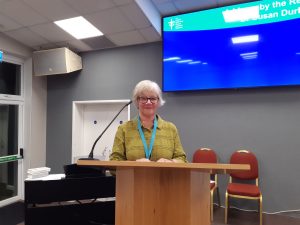
Dr Durber began by speaking of the place of love and relationships in ecumenism, and thanked the URC for the ordination promise its ministers make: to cherish love towards all other churches. The recent WCC assembly spoke of the need for an ‘ecumenism of the heart’, moved by the love of Christ.
She wanted to focus on the URC’s ‘relation to unity’ and what our present and future might be, and described a significant personal moment of deep ecumenism while staying at the Bossey Ecumenical Institute near Geneva. However, Susan recognised that one dominant story in the URC is of ecumenical disappointment: ‘The journey on which we set out – the journey of organic, or structural, unity – was not joined by other churches and neither does it seem to have renewed our own – and so we are left wondering whether, after all, it was right to put so much of the lives of our very best into that endeavour.
Dr Durber spoke of a ‘kind of corporate trauma’ at once being ‘in tune with the age’ but now being left as ‘ecumenical orphans’. She acknowledged that part of the URC’s story is about being on the ‘losing side’. And certain things make her sad:
- a decline in local ecumenical partnerships
- attempts to rename the Week of Prayer for Christian Unity the ‘week of celebration of Christian diversity’
- the idea that talking about doctrine is divisive, and that we should concentrate instead on serving our communities together
- the way that United and uniting churches are sometimes marginalised by an emphasis on confessional identities
However, Dr Durber said that, though there is ‘a place for honest sorrow at what we feel we have lost or are losing’, this ‘should not be allowed to become destructive of the life that is in us and of the grace that God is pouring out upon us’.
Noting that the WCC emerged out of the violence of the two world wars as the churches strove to be a sign of the unity and reconciliation that the world needed then, she argued that unity should be visible but not restricted to any one form, and certainly not to be imagined only as ‘structural’. It’s not about forming a super church but making the unity that God gives somehow vivid among us. Moreover, organic unity ‘might not be the only possible expression of the unity we seek’. She argued that no church should believe itself to be the only true church – and recognised how the language of the Roman Catholic church, for example, has moved to speaking about ‘an ecumenism that takes us into a new future together as a renewed Church’. She said: ‘We in the URC … are committed to ecumenism not because we believe it would be more efficient, but because it is more faithful and we will find Christ there. We know we are not the whole Church on our own and we want to belong to the whole Church.’
Dr Durber believed ecumenism has been more successful than we might expect over the past 50 years, and that it reveals itself in diverse ways, not least in worship. She called those who worked to make the URC unions of 1972, 1981 and 2000 her heroes but wondered how the URC could ‘kick start our ecumenical vocation for these times’. She offered five practical suggestions:
- Stop thinking of ourselves so much as a ‘denomination’ and regard ourselves as ‘a kind of “order” within the one great Church – making more radical efforts to take our gifts and people into the wider church without simply giving up our URCness.
- Work harder at receiving the gifts of the wider church into our own life within the URC.
- Enter ‘the age of world Christianity’ – move beyond a Eurocentric ecumenism that grew out of colonialism.
- Let go of wanting to be recognised or celebrated as ourselves, but offer the URC’s gifts to grow in the wider church, ‘and don’t be peeved if they grow without our name on them’.
- Celebrate our experience in ‘holding together in unity while taking decisions about the most divisive issues among and between the churches today: sexuality and gender.’
Maybe the URC ‘did get stuck on one way of doing ecumenism’, Dr Durber concluded, ‘but we are not wrong to believe that we are not the whole Church alone and that the unity of the church should always be made visible, tangible and embodied … I believe in our ecumenical vocation. I believe that we should never retreat from it, but deepen it. Let’s take that legacy and spend it in today’s church and world, in ways we wouldn’t and couldn’t have imagined 50 years ago.’ We are, she said, ‘people of death and resurrection’.
Reporting team: Andy Jackson, Ann-Marie Nye, Stephen Tomkins, Laurence Waring

